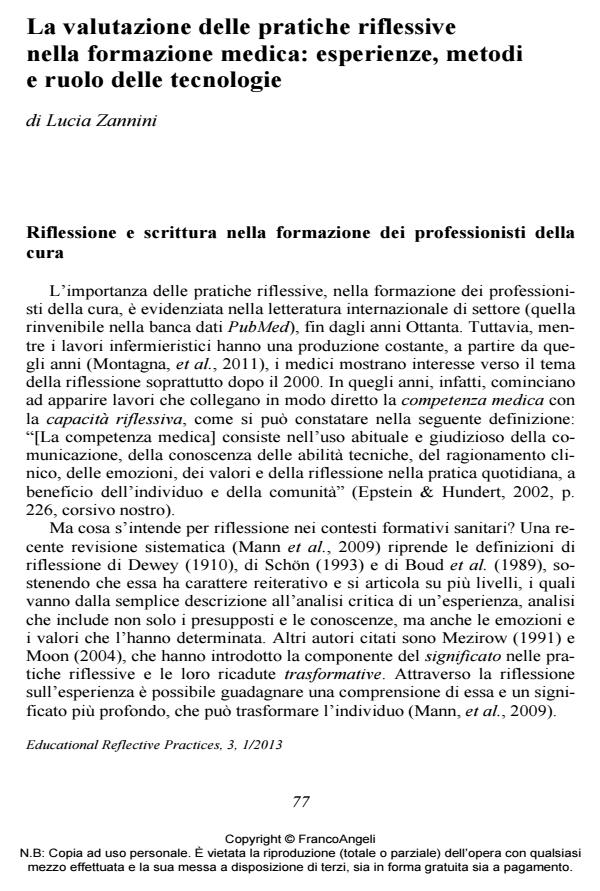La valutazione delle pratiche riflessive nella formazione medica: esperienze, metodi e ruolo delle tecnologie
Titolo Rivista EDUCATIONAL REFLECTIVE PRACTICES
Autori/Curatori Lucia Zannini
Anno di pubblicazione 2013 Fascicolo 2013/1
Lingua Inglese Numero pagine 20 P. 77-96 Dimensione file 187 KB
DOI 10.3280/ERP2013-001006
Il DOI è il codice a barre della proprietà intellettuale: per saperne di più
clicca qui
Qui sotto puoi vedere in anteprima la prima pagina di questo articolo.
Se questo articolo ti interessa, lo puoi acquistare (e scaricare in formato pdf) seguendo le facili indicazioni per acquistare il download credit. Acquista Download Credits per scaricare questo Articolo in formato PDF

FrancoAngeli è membro della Publishers International Linking Association, Inc (PILA), associazione indipendente e non profit per facilitare (attraverso i servizi tecnologici implementati da CrossRef.org) l’accesso degli studiosi ai contenuti digitali nelle pubblicazioni professionali e scientifiche.
In this paper the evaluation of reflective practices in medical education is analyzed, paying special attention to undergraduate medical training. Firstly, some definitions of reflection are reported, showing how this practice is differently conceptualized within the field of medical education. Subsequently, some prompts, aimed at facilitating students’/professionals’ reflection through writing, are reported. The importance of discussing reflective writings with peers/teachers is highlighted, and the value of receiving feedback is emphasized. The role of technologies in sharing writings and in conveying feedback is described. Finally, some tools to assess students’ reflective writings are critically discussed.
- L'uso di metafore linguistiche per generare soft skills nelle professioni sanitarie Marika D'Oria, in EDUCATIONAL REFLECTIVE PRACTICES 2/2016 pp.72
DOI: 10.3280/ERP2016-002006 - La formazione alle soft skills nel Corso di laurea in Medicina: uno studio qualitativo sulle scritture riflessive di un campione di studenti Lucia Zannini, Maria Benedetta Gambacorti-Passerini, Pier Maria Battezzati, in EDUCATIONAL REFLECTIVE PRACTICES 2/2016 pp.9
DOI: 10.3280/ERP2016-002002
Lucia Zannini, La valutazione delle pratiche riflessive nella formazione medica: esperienze, metodi e ruolo delle tecnologie in "EDUCATIONAL REFLECTIVE PRACTICES" 1/2013, pp 77-96, DOI: 10.3280/ERP2013-001006